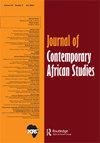妇女与“另一个房间”:解放社会。
IF 0.8
Q2 AREA STUDIES
引用次数: 0
摘要
泛非主义是一种强调黑人兄弟情谊的意识形态,无论他们身在何处。它的进步是每个人的事情,无论男性还是女性,在非洲和海外。泛非主义已经从黑人解放和争取政治权力的层面上升到社会、经济和政治解放的层面,积极地点燃了一些非洲妇女在被限制在“另一个房间”的情况下实现“自我”、为国家建设做出贡献的愿望。尼日利亚总统穆罕默杜·布哈里(Muhammadu Buhari)的一段声明点燃了“另一个房间”的前提:“……但她(他的妻子)属于我的厨房、客厅和另一个房间。”本文旨在揭示泛非主义与妇女主义的原则和关系。文章进一步主张,女性在被压抑的同时也在迸发;挑战阻碍她们在社会中成长和发展的父权角色。该文件的结论是,妇女解放、性别平等和赋予妇女权力是人类本身问题的核心,因此具有普遍性,主张她们在全球社会中的地位是根本的。本文章由计算机程序翻译,如有差异,请以英文原文为准。
Women and 'the Other Room': Emancipating the Society.
Pan-Africanism is an ideology which emphasizes the brotherhood of the black people wherever they are. Its advancement is everyone’s affair whether male or female, within Africa and the Diaspora. Pan-Africanism has moved from the level of black liberation and struggle for political power to social, economic, and political emancipation, which has positively ignited the desire in some African women to actualize ‘self’ and contribute to nation building in spite of being confined to “the other room”. The premise of the “other room” was ignited by a statement made by the President of Nigeria, President Muhammadu Buhari that: “... but she [his wife] belongs to my kitchen and my living room and the other room”. This paper sets out to lay bare the principles and relationship of Pan-Africanism and Womanism. The paper further advocates that women in spite of being suppressed are bursting forth; challenging patriarchal roles, which most times impede their growth and development in the society. The paper concludes that women’s emancipation, gender equality and women’s empowerment are at the heart of the question of humanity itself and are thus universal in character and asserting their place in the global community is fundamental.
求助全文
通过发布文献求助,成功后即可免费获取论文全文。
去求助
来源期刊

Journal of Contemporary African Studies
AREA STUDIES-
CiteScore
2.20
自引率
0.00%
发文量
18
期刊介绍:
Journal of Contemporary African Studies (JCAS) is an interdisciplinary journal seeking to promote an African-centred scholarly understanding of societies on the continent and their location within the global political economy. Its scope extends across a wide range of social science and humanities disciplines with topics covered including, but not limited to, culture, development, education, environmental questions, gender, government, labour, land, leadership, political economy politics, social movements, sociology of knowledge and welfare. JCAS welcomes contributions reviewing general trends in the academic literature with a specific focus on debates and developments in Africa as part of a broader aim of contributing towards the development of viable communities of African scholarship. The journal publishes original research articles, book reviews, notes from the field, debates, research reports and occasional review essays. It also publishes special issues and welcomes proposals for new topics. JCAS is published four times a year, in January, April, July and October.
 求助内容:
求助内容: 应助结果提醒方式:
应助结果提醒方式:


